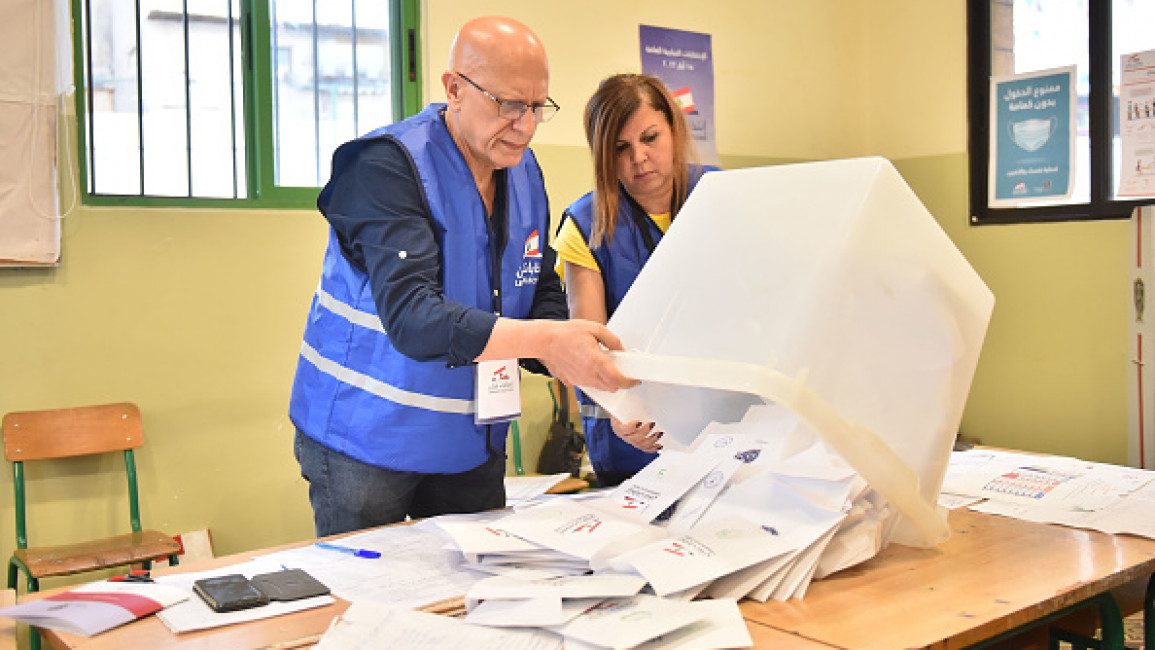Lebanon’s preliminary results suggest win for independents, loss for Hezbollah
Welcome to The New Arab's coverage of Lebanon's General Election 2022 held on May 15, 2022. Follow live updates, results, analyses, and opinion in our special hub here.
Projections for Lebanon’s parliamentary election results on Monday suggested a big win for new independent candidates and a loss for Hezbollah and its governmental allies.
Initial predictions, based on self-reported votes collected by electoral parties, showed independents winning at least 11 seats across the country. In 2018, only one independent was elected to parliament.
Official election results will be released within the next 72 hours, leaving some space for the fate of individual seats to change, though broad trends will likely stay the same.
Some races were coming down to the wire on Monday, with districts like Matn waiting for just a few dozen votes to act as kingmakers. Other districts, like Jenin in the south, faced allegations of electoral fraud which could impact electoral results.
Many of the independents are projected to oust long-time parliamentarians belonging to Lebanon’s core parties. In Lebanon’s third southern district, historically under Hezbollah’s sway, independent candidate, Elias Jradi, is on path to seize Hezbollah MP Assaad Hardan’s seat.
Lebanon has been dominated by sectarian political parties and elections normally the battleground for these parties to divide power between themselves, to the exclusion of outsider candidates.
The stakes for Lebanon’s 2022 election are higher than ever, as the country tries to chart a path forward out of an economic crisis dubbed one of the world’s worst since the 1850s.
Independents and Lebanese Forces projected to be the big winners
“We are waiting for the official results, but it looks really positive – even more than we expected,“ Laury Haytayan, the national coordinator for the opposition list Taqadum which is projected to win two seats, told The New Arab.
“It’s not hard to understand why people voted for change. The political class has been there for thirty years, the same political parties that led to the catastrophe that we are living in today … people have lost everything,” Haytayan said.
The Lebanese Forces (LF), a former Maronite political party and former civil war militia, also came out victorious on Sunday. The party is projected to win 20 seats in parliament, replacing Gebran Bassil’s Free Patriotic Movement (FPM) as the largest bloc in the body.
The LF styled themselves as an anti-Hezbollah, pro-reform political party during the run-up to the election. The group adopted the rhetoric of Lebanon’s autumn 2019 revolution, when millions took to the streets demanding an end to the country’s rampant corruption.
“This win translates the will of the Lebanese people who have been vocal about the need for change since October 2019 and even before. The Lebanese people have decided to give their trust to the group who they believe can translate their hopes into action,” Marc Saad, a communication officer for the LF, told The New Arab.
Simultaneously, the group positioned itself as the only party which could stand up to Hezbollah and its Christian partner, the FPM.
A new parliamentary configuration
Hezbollah’s hold on Lebanon’s parliament, previously dominated by it and its allies, will likely weaken if projections are correct.
The configuration of a future parliament is unknown, with the emergence of three major blocs: Hezbollah and its allies, the Lebanese Forces and its allies and an emerging independent bloc.
Further, the form the relationship between the LF and the independent bloc will take is unclear. Though the two were nominally at odds in the election, parliamentary realities could affect this dynamic.
The unity of the opposition, many of which are coming from different lists with different political ideologies, is also up in the air.
“We understand the challenges ahead and we are ready to work with elected MPs who share the same values and vision to form a unified front to regain back our country,” Carol Malouf, a political and communications advisor for independent candidate Najat Aoun, told The New Arab.



